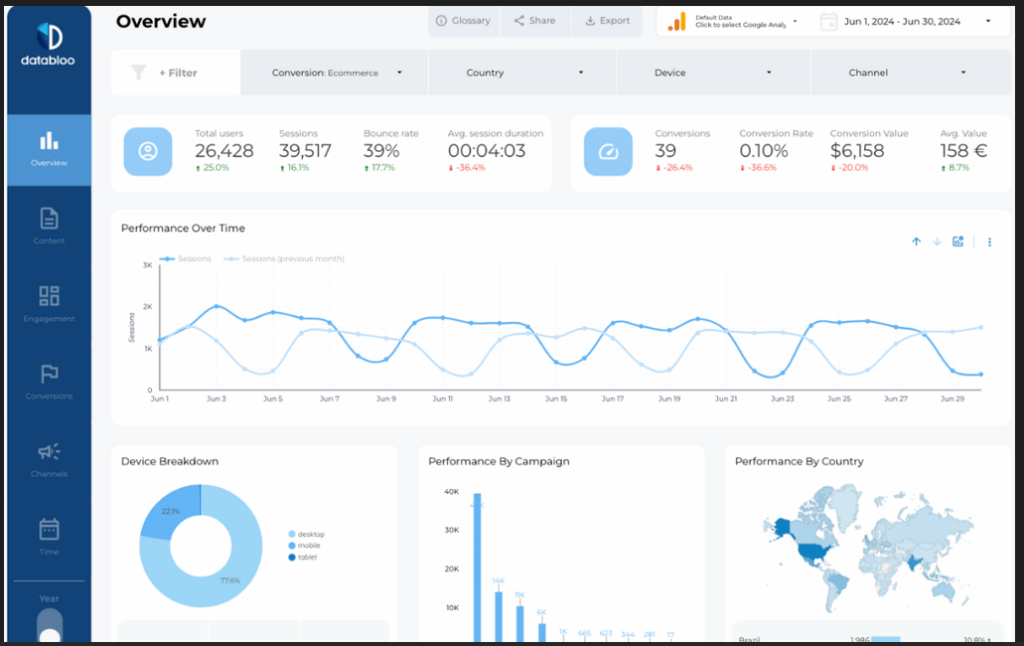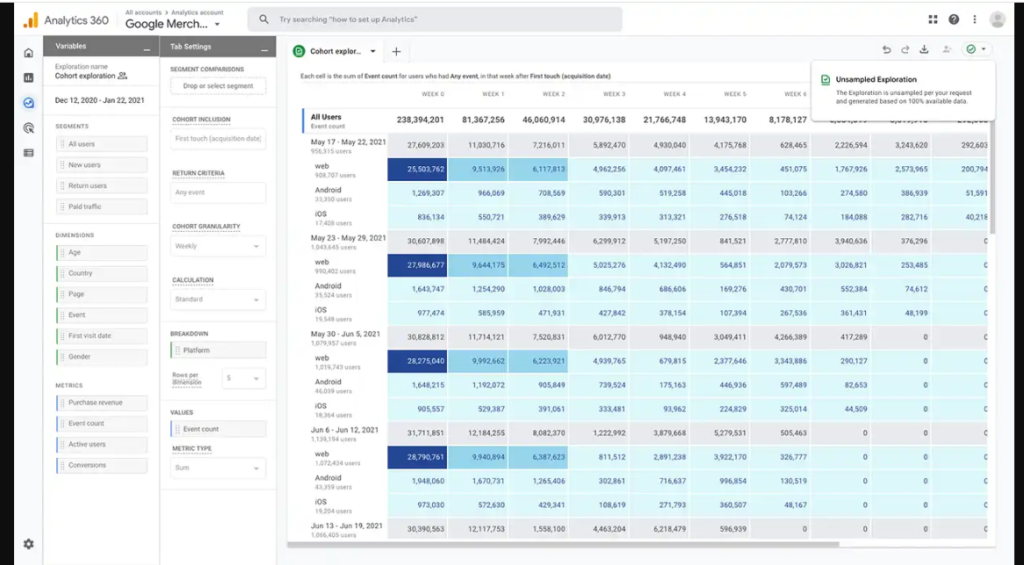Introduction
Understanding user behavior is essential for any business aiming to thrive in a competitive environment, and Google Analytics offers powerful tools to facilitate this. With its innovative features and intuitive design, GA4 enables organizations to gather and analyze data effectively. This blog post will delve into the key aspects of Google Analytics 4, emphasizing its reporting and analytics capabilities, and how these tools can empower businesses to make informed, data-driven decisions.
Ease of Use
When it comes to ease of use, Google Analytics has made significant improvements compared to its predecessor, Universal Analytics. However, there is still a learning curve, especially for users who are new to data analytics tools. The platform is designed to be more streamlined, but it introduces new features, such as event-based tracking and cross-platform reporting, which can feel overwhelming for first-time users.
That said, for experienced users or those upgrading from Universal Analytics, the updated interface feels modern and customizable. Navigation is simpler once you get used to the event-based model, and the system offers helpful prompts for setting up reports, tracking key metrics, and customizing dashboards. For businesses that rely heavily on data-driven decisions, Google Analytics is more intuitive and flexible, but users should expect some time investment in learning the platform.

Key Features
Google Analytics offers a powerful set of features that help businesses make data-driven decisions. Here are the key features that make it a leading tool for tracking and analyzing user behavior:
Advanced Data Collection
Google Analytics provides comprehensive data collection across websites, apps, and offline interactions. This allows businesses to track the full customer journey and gain valuable insights into user behavior.
Customizable Dashboards
One of the standout features of Google Analytics is its customizable dashboards. You can arrange and display key performance indicators (KPIs) to suit your business needs, ensuring you always have a clear view of the most important metrics.
Integration with Popular Platforms
Google Analytics integrates seamlessly with other popular platforms such as Google Ads, e-commerce systems, and CRM tools. This integration allows for streamlined data flow and efficient management of your marketing efforts.
AI-Powered Insights
With AI-powered insights, Google Analytics automatically identifies trends, anomalies, and opportunities within your data. This helps users make quicker decisions and act on important findings without manually analyzing massive datasets.
Granular User Segmentation
Google Analytics allows businesses to segment their audience based on detailed factors like behavior, demographics, and traffic sources. This enables highly targeted marketing efforts and personalized user experiences, improving overall campaign effectiveness.
Pricing
When evaluating Google Analytics , one of the most critical factors to consider is its pricing structure. Understanding the costs involved can help businesses of all sizes determine whether this tool aligns with their budget and needs.
Free Version
Google Analytics offers a free version that includes a wealth of features suitable for small to medium-sized businesses. This version allows users to track website traffic, user engagement, and basic conversion metrics without any financial investment. The free option is particularly appealing for startups and individual entrepreneurs who want to make data-driven decisions without incurring additional costs.
Paid Version
For larger organizations or those requiring advanced features, Google Analytics offers a paid version known as Google Analytics 360. This premium option provides additional capabilities, such as:
- Increased data limits: More extensive data tracking and analysis.
- Advanced features: Enhanced reporting and attribution modeling.
- Dedicated support: Access to Google support for any issues or queries.
The pricing for Google Analytics 360 is not publicly listed on the Google website and typically requires a custom quote based on the organization’s specific needs. This can lead to varying costs, often starting from several thousand dollars annually.
Cost Comparison Table
| Feature | Free Version | Google Analytics 360 |
|---|---|---|
| Cost | Free | Custom pricing |
| User Access | Limited | Unlimited users |
| Data Collection Limit | Standard | High volume |
| Support | Community support | Dedicated support |
| Advanced Features | No | Yes |
| Custom Reporting | Basic | Advanced |

When considering Google Analytics , it’s essential to weigh the pricing against the features and benefits it offers. The free version provides excellent value for small businesses, while the paid version caters to enterprises needing more extensive capabilities. Understanding these options will enable you to make an informed decision on which version best suits your business needs.
Reporting & Analytics
When it comes to making data-driven decisions, effective reporting and analytics are crucial. This is where Google Analytics shines, offering advanced features that empower users to gain valuable insights from their data.
Comprehensive Reporting
Google Analytics 4 provides a wide range of reporting options that cover various aspects of user interaction with your website or app. The dashboard is customizable, allowing you to focus on the metrics that matter most to your business. Key reports include user demographics, traffic sources, and engagement metrics, which help you understand who your audience is and how they are interacting with your content.
Real-Time Data
One of the standout features of Google Analytics is its ability to deliver real-time data. This means you can monitor user behavior as it happens, giving you the agility to respond quickly to trends or issues. For instance, if a particular campaign is driving significant traffic, you can adjust your marketing strategies on the fly to capitalize on that momentum.
Event Tracking
With Google Analytics , you can easily set up event tracking to monitor specific actions taken by users, such as downloads, video views, or button clicks. This level of granularity helps you understand how users engage with your content beyond simple page views, providing a fuller picture of their behavior.
Enhanced Analysis Tools
The platform includes advanced analysis tools like Exploration, which allows you to create custom reports and visualize your data in various formats. This feature is particularly beneficial for deeper dives into user behavior and conversion paths. You can segment your audience and filter data to uncover trends that may not be immediately visible in standard reports.
Integration with Other Tools
Google Analytics seamlessly integrates with other Google products, such as Google Ads and Google Data Studio. This integration allows you to combine data from multiple sources, giving you a holistic view of your marketing performance. By using these combined insights, you can optimize your campaigns more effectively.
In conclusion, Google Analytics offers robust reporting and analytics capabilities that are essential for any organization looking to make informed, data-driven decisions. Its comprehensive features and integration options enable users to analyze performance and optimize strategies effectively.
Conclusion
In an increasingly data-driven world, having the right tools for reporting and analytics is essential for businesses looking to thrive. Google Analytics stands out as an invaluable resource, offering powerful features that cater to the needs of modern marketers and analysts alike. From its customizable dashboard to real-time data monitoring and advanced event tracking, GA4 empowers users to gain deeper insights into their audience’s behavior.
The integration capabilities with other Google products further enhance its value, allowing for a comprehensive view of marketing performance across different channels. As organizations seek to optimize their strategies and drive growth, leveraging the reporting and analytics tools in Google Analytics 4 can provide the clarity and actionable insights needed for informed decision-making.
By embracing these capabilities, businesses can not only measure their success but also refine their approaches, ensuring they stay ahead in a competitive landscape. Ultimately, Google Analytics 4 proves to be a pivotal tool for anyone committed to harnessing data for strategic advantage.

